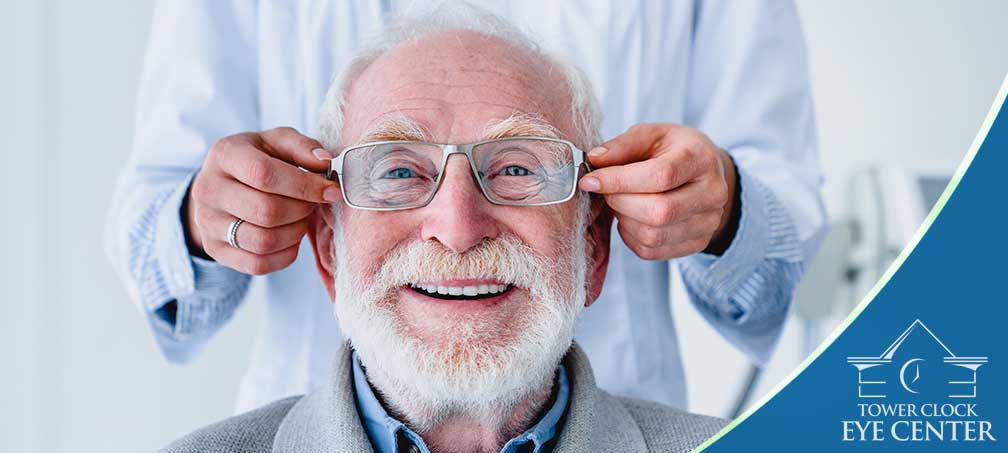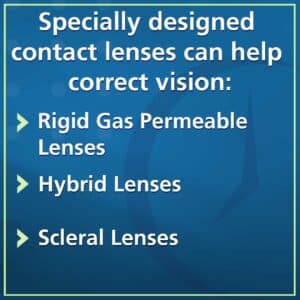
Keratoconus
At Tower Clock Eye Center, we specialize in diagnosing and treating keratoconus, a progressive condition that affects the cornea and can impact your vision over time. Our experienced ophthalmologists and optometrists use advanced diagnostic tools, such as corneal topography and pachymetry, to accurately assess the severity of your condition.
With the latest treatments, including corneal cross-linking and corneal transplants, we work closely with you to develop a personalized care plan that helps manage keratoconus and preserve your vision. We provide comprehensive care, using state-of-the-art techniques, so you can maintain the best possible vision at every stage of the disease.
What Is Keratoconus?

The condition typically begins in adolescence or early adulthood and may continue to worsen over time. As keratoconus progresses, you may notice that your prescription changes frequently, your sensitivity to bright light increases, and you have trouble achieving a sharp focus even with corrective lenses.
Eventually, soft contact lenses may no longer provide adequate correction, and you may need specialized options such as rigid gas permeable or scleral lenses. In some cases, surgical treatments such as corneal cross-linking or a cornea transplant may be required. Early detection and management are crucial to slow the progression of the condition and preserve your vision.
Potential Causes of Keratoconus
The exact cause of keratoconus isn’t fully understood, but it is believed to stem from a mix of genetic and environmental factors. People with a family history of keratoconus or certain medical conditions may be at higher risk.
Key risk factors for keratoconus include:
- Family history of keratoconus
- Medical conditions such as Ehlers-Danlos syndrome and Down syndrome
- Frequent eye rubbing
- Excessive UV light exposure
- Gradual thinning of the cornea
Understanding these risk factors is crucial for early diagnosis and effective management. By being aware of these factors, you can take proactive steps to preserve your vision and slow the progression of keratoconus.
The Importance of Early Detection

Getting an early diagnosis allows us to slow the disease’s progression and preserve your vision. Regular eye exams are crucial, especially if you have a family history of keratoconus or are experiencing early signs of the condition.
The American Optometric Association recommends corneal tomography or topography screenings for individuals at higher risk, such as those with a family history of keratoconus. These advanced imaging techniques can help detect early symptoms before they significantly affect your vision.
When diagnosed early, treatments like corneal cross-linking can stabilize the cornea and reduce the need for more invasive procedures later on. It’s crucial to have your doctor monitor your corneal thickness so they can adjust treatment plans and manage your keratoconus more effectively.
Diagnosing Keratoconus
Diagnosing keratoconus involves a series of tests to assess the shape of the cornea, its thickness, and any irregularities. Some of the most common diagnostic methods include:
Corneal Topography and Tomography
These advanced imaging techniques create a detailed map of your cornea’s surface and measure its thickness. They help detect early signs of keratoconus by identifying subtle changes in the corneal shape. Regular monitoring using these tools is key to tracking the disease’s progression and adjusting treatments as necessary.
Slit Lamp Examination
A slit lamp exam uses a specialized microscope to detect corneal thinning and other abnormalities. This test is particularly useful for identifying advanced keratoconus, where scarring or severe thinning may be present.
Corneal Pachymetry
This test measures the thickness of the cornea and plays a crucial role in tracking the progression of the disease. As keratoconus leads to progressive thinning of the cornea, pachymetry assists doctors in determining the most appropriate treatment options based on the severity of the thinning.
Medical and Family History Review

Regular monitoring is essential to track the disease’s progression. Early diagnosis through these tests allows us to start treatment right away to slow progression and preserve your vision. Without treatment, advanced keratoconus can lead to significant vision loss, which is why proactive management can make all the difference.
Progressive Treatments Available
Effectively managing keratoconus requires a range of treatments tailored to the severity of the condition. At Tower Clock Eye Center, we offer advanced solutions to help patients improve their vision and slow the disease’s progression. Treatment options vary depending on how far along the keratoconus is and what works best for each individual. Here are some of the treatment options available:
Specialty Contact Lenses

- Rigid Gas Permeable Lenses: These lenses provide a smooth surface over the irregular cornea, reducing distortion and improving vision.
- Hybrid Lenses: A combination of rigid and soft lenses, they offer the comfort of soft lenses with the visual clarity of hard lenses.
- Scleral Lenses: These larger lenses rest on the white part of your eye, creating a smooth optical surface that improves vision.
Corneal Cross-Linking (CXL)
Corneal cross-linking is a minimally invasive procedure that strengthens the cornea using UV light and riboflavin (vitamin B2). It helps stabilize the cornea and slow the progression of keratoconus. This treatment is most effective in the early stages of the disease.
Intrastromal Corneal Ring Segments (ICRS)
These small, arc-shaped inserts are placed in the cornea to reshape its curvature. This treatment can improve vision and enhance contact lens tolerance in patients with moderate keratoconus.
Corneal Transplant (Keratoplasty)
In advanced cases of keratoconus where other treatments are no longer effective, a corneal transplant may be necessary. This surgical procedure involves replacing the diseased cornea with a healthy donor cornea to restore vision. While effective, it requires long-term follow-up care.
No matter what option you choose, your treatment plan will be tailored to your specific condition and lifestyle. Depending on the stage of your keratoconus, we may recommend a combination of treatments, including specialty contact lenses or advanced procedures like corneal cross-linking, to best support your vision needs.
FAQs About Keratoconus
What Changes in Vision Occur With Keratoconus?
Keratoconus causes blurry or distorted vision, irregular astigmatism, increased sensitivity to bright light, and difficulty seeing at night. As the condition progresses, you may need frequent changes to your prescription.
How Do I Receive a Diagnosis?
A keratoconus diagnosis is made through a combination of tests, including corneal topography, slit lamp examination, and corneal tomography. If you’re experiencing blurry vision that glasses can’t correct, it’s time to see an eye care professional.
Are There Complications With Keratoconus?
Yes, advanced keratoconus can lead to corneal scarring, corneal hydrops (sudden swelling of the cornea), and vision loss. In some cases, a corneal transplant may be necessary if other treatments don’t restore clear vision.
Is There Anything I Can Do To Prevent It?
While keratoconus can’t always be prevented, avoiding excessive eye rubbing and protecting your eyes from UV light may reduce the risk of progression. Regular eye exams can also help with early detection and timely treatment to help prevent further eye damage.
Take Control of Your Vision Today

From specialty contact lenses like rigid gas permeable to advanced procedures such as corneal cross-linking and corneal transplants, our team provides personalized care to help you maintain clear vision and healthy eyes.
Don’t let blurry or distorted vision affect your life. If you’re experiencing frequent changes in your prescription, sensitivity to light, or difficulty seeing clearly even with your current glasses or contacts, these could be symptoms of keratoconus. Schedule an eye exam with us today to get the diagnosis and treatment you need.
Contact Tower Clock Eye Center at (920) 499-3102 to schedule a comprehensive eye exam. We’re here to help you protect your vision.
